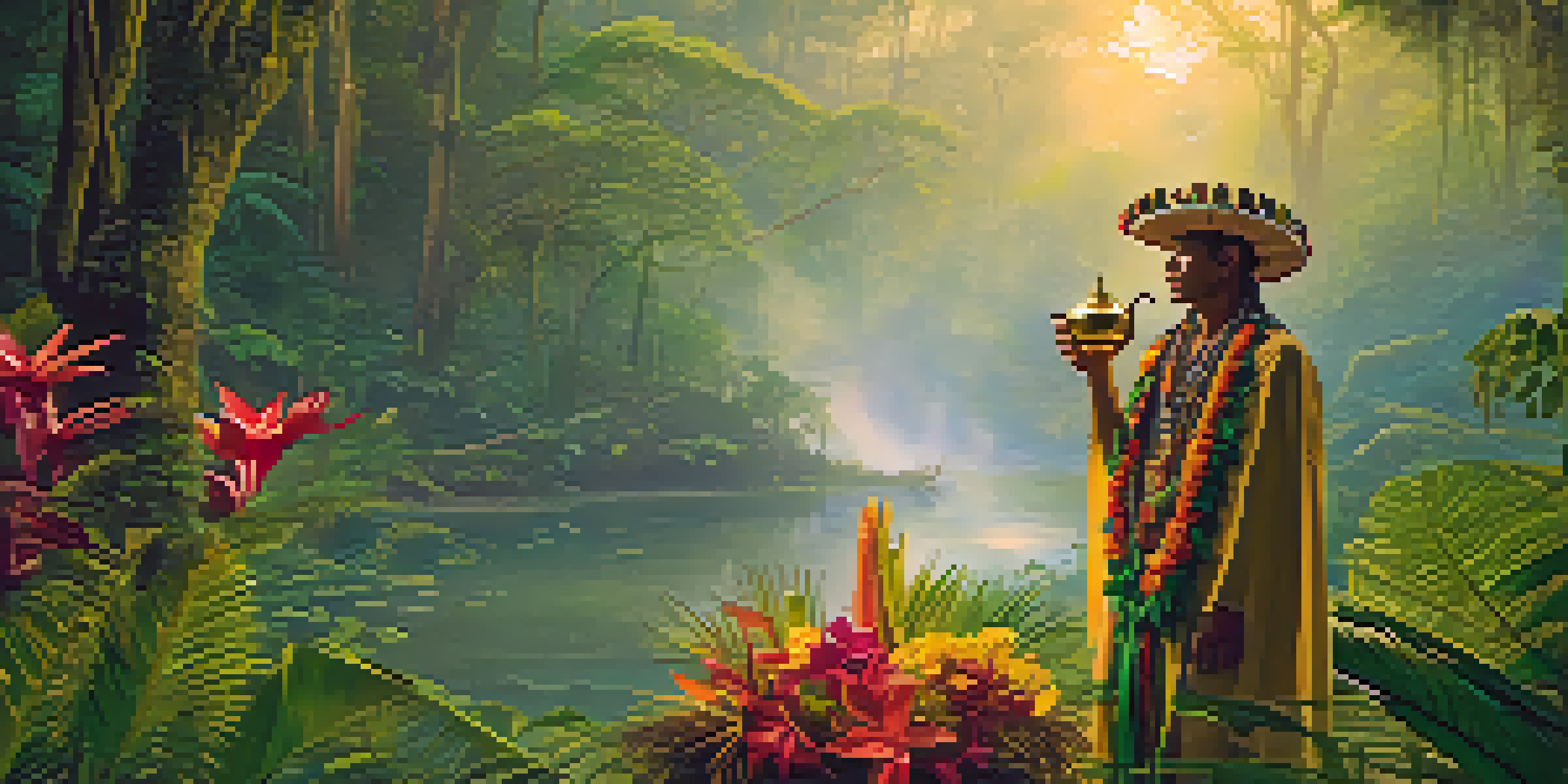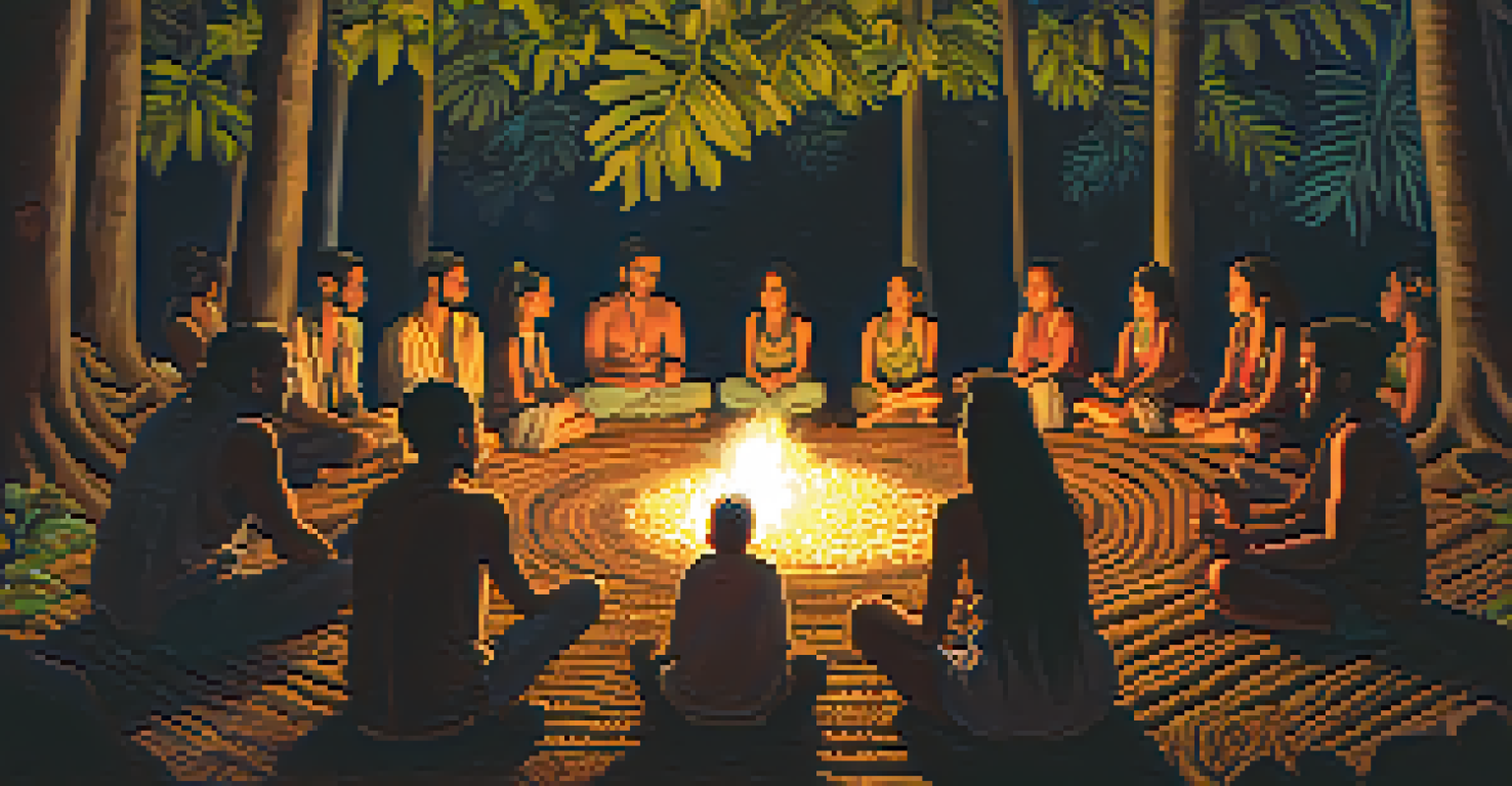Mythology and Ayahuasca: Indigenous Beliefs and Narratives

Understanding Ayahuasca: A Sacred Plant Medicine
Ayahuasca is more than just a plant; it’s a powerful brew made from the Banisteriopsis caapi vine and other ingredients. Used traditionally by indigenous tribes in the Amazon, it serves as a spiritual guide, leading users on introspective journeys. The brew is renowned for its psychoactive properties, which are attributed to the presence of DMT, a compound that induces vivid visions and profound insights.
Ayahuasca is a teacher that opens the heart and mind, revealing the truths we must confront to heal.
For many indigenous cultures, Ayahuasca represents a bridge between the physical and spiritual worlds. It’s often consumed in ceremonial settings, facilitated by a shaman who helps navigate the experience. This sacred context is crucial, as it underscores the belief that the medicine can reveal deep truths about one’s self and the universe.
As Ayahuasca gains popularity outside its traditional roots, understanding its cultural significance becomes essential. Many practitioners emphasize the importance of approaching Ayahuasca with respect, acknowledging the rich tapestry of beliefs and practices that have developed over centuries.
The Role of Mythology in Indigenous Ayahuasca Practices
Mythology plays a vital role in shaping the beliefs surrounding Ayahuasca. Indigenous narratives often tell tales of how the plant was discovered and its purpose as a teacher. These stories not only preserve cultural heritage but also provide context for the spiritual experiences of those who partake in the ceremonies.

For example, some myths describe the journey of a hero who encounters the spirit of Ayahuasca, receiving wisdom that is essential for healing and guidance. Such narratives highlight the idea that the plant is not merely a substance but a sentient being with its own consciousness, capable of imparting lessons to those who seek them.
Ayahuasca as a Spiritual Teacher
Indigenous cultures view Ayahuasca as a teacher that imparts wisdom through personal insights and transformative experiences.
Through these stories, participants in Ayahuasca ceremonies are reminded of their connection to nature and the larger cosmos. Engaging with these myths can enhance the experience, fostering a deeper understanding of the lessons that arise during the journey.
Indigenous Beliefs: Ayahuasca as a Teacher
In many indigenous cultures, Ayahuasca is revered as a teacher, capable of imparting knowledge and wisdom. Participants often enter ceremonies with specific questions or intentions, hoping to gain insight into personal challenges or broader life questions. The visions experienced during these ceremonies can be interpreted as lessons from the plant, guiding individuals on their life paths.
In the depths of darkness, we find the light of our own understanding.
For instance, some practitioners report experiencing vivid imagery that relates directly to their personal issues, suggesting a deep, intuitive understanding of their struggles. This connection fosters a sense of accountability, encouraging individuals to take action in their lives based on the insights gained.
Moreover, the communal aspect of Ayahuasca ceremonies reinforces these beliefs. Sharing experiences and interpretations within a group helps to validate individual insights and reinforces the idea that Ayahuasca is a collective teacher, guiding the community as a whole.
Healing and Transformation: Ayahuasca's Role in Wellness
Ayahuasca is often associated with healing, both physically and emotionally. Many indigenous cultures use it to address various ailments, believing that the brew can cleanse the body and spirit. The process of purging, which often accompanies the experience, is seen as a necessary step in releasing negative energies and emotions.
Participants frequently report transformative experiences that lead to profound personal growth. Stories abound of individuals overcoming trauma, addiction, and depression after engaging with Ayahuasca. This healing potential has drawn interest from people worldwide, seeking alternative therapies that traditional medicine may not provide.
Cultural Respect in Ayahuasca Use
Engaging with Ayahuasca requires respect for its cultural roots to prevent commodification and ensure authentic experiences.
However, it’s essential to approach this healing with caution. While many find Ayahuasca transformative, it’s crucial to respect its cultural context and ensure that ceremonies are conducted safely and ethically, ideally under the guidance of experienced practitioners.
The Spiritual Dimensions of Ayahuasca Experiences
The spiritual dimensions of Ayahuasca experiences are as varied as the individuals who partake in them. Many report feeling a deep connection to the universe, experiencing oneness with nature and all living beings. This transcendental aspect is often described as a profound awakening, leading to shifts in perception and understanding.
In indigenous cosmology, plants like Ayahuasca are considered guardians of wisdom, providing insights that transcend ordinary understanding. Such experiences often encourage individuals to reevaluate their life choices, leading to a more conscious and intentional way of living.
The spiritual journey doesn’t end with the ceremony; many participants find themselves integrating these experiences into their daily lives. This ongoing process of introspection and growth is a testament to the lasting impact of Ayahuasca on spiritual development.
Cultural Appropriation vs. Respectful Engagement
As Ayahuasca gains popularity in the West, the conversation around cultural appropriation becomes increasingly relevant. Many indigenous communities express concern that their sacred practices are being commodified, stripped of their spiritual significance. This highlights the importance of approaching Ayahuasca with respect and understanding its cultural roots.
Respectful engagement involves seeking out authentic experiences led by indigenous practitioners who honor the traditional ceremonies. It’s crucial for participants to recognize the historical and cultural context of Ayahuasca, fostering a deeper appreciation for the plant’s role in indigenous societies.
Healing Through Ayahuasca Journeys
Ayahuasca ceremonies are associated with healing, offering emotional and physical transformations for participants.
By prioritizing authenticity and respect, individuals can partake in Ayahuasca ceremonies in a way that honors its origins, ensuring that these powerful traditions are preserved for future generations.
The Future of Ayahuasca in a Globalized World
The future of Ayahuasca in our increasingly globalized world is a complex topic that invites both excitement and caution. As interest in the brew continues to grow, there’s potential for positive change, such as increased awareness of indigenous cultures and practices. However, this also raises concerns about exploitation and the dilution of traditional practices.
Indigenous communities are working to navigate this evolving landscape, often seeking ways to share their knowledge while protecting their sacred traditions. Collaborative efforts between indigenous practitioners and those interested in Ayahuasca can foster mutual respect and understanding, ensuring that the wisdom of these cultures is honored.

Ultimately, the future of Ayahuasca will depend on how both practitioners and participants choose to engage with its rich cultural heritage. By fostering respectful relationships and honoring indigenous narratives, we can ensure that Ayahuasca continues to thrive as a source of wisdom and healing.